Last week, I posted a thread on twitter in response to Ewan Mcgregor’s video addressing the racist harassment Moses Ingram has been getting from people who identify as Star Wars fans—I’ll embed the first tweet here so you guys can have a direct link to see comments if you’re interested, but I’ll be formatting all of my tweets below (and adding some additional thoughts that were too lengthy for the 280-word limit) so you don’t have to click through just to read the thing.
I’d always been confused as to how some Star Wars fans could misunderstand the franchise they claim to love so much, but reading the work of historian Heather Cox Richardson really opened my eyes to the fact that the original movie served as a kind of Rorschach test for viewers in 1977.
Many of the (majority) white male American fans identified with Luke (or Han, who I’ll get into later), who had rare, god-given abilities that made him special, but was simply unable to achieve his true potential because of circumstances caused by a tyrannical government—after all, Star Wars is essentially a Western; and in the spirit of Westerns that were dominating TV channels in the 70s (there were 29 running series that decade alone) it was perceived to be a story glorifying many of the same themes: rugged individualism, bootstrap ideology, serving a power higher than the rule of law, etc.
The original trilogy was released just after the height of the Cold War, after McCarthyism had caused the USA to officially adopt conservative-movement (white) Christian/Puritan culture into the mainstream—and it had permeated into every pocket of society, including how audiences perceived these movies about space wizards. Even though non-white, non-male, non-American fans of the original trilogy very likely interpreted the story differently, they were in the minority as the fan base was mostly dominated by men and boys who had internalized Western Cold War ideology: much of which continues to dominate our society today.
This didn’t start to change until 1999, when Episode 1 hit theaters. And this was when the first waves of backlash really began to hit—when fans of the original trilogy started feeling like maybe the new movie wasn’t exclusively for them. And as the franchise has grown, this fervor has only become more pronounced. The irony of course is that George Lucas modeled the villains of Star Wars after Republican politicians of the era—Palpatine was inspired by Nixon and the Empire grew out of a highly corrupt oligarchal republic. (Hmm!!) The political subtext of the franchise as a whole is pro-socialist.
I would actually argue that the original trilogy took a far more leftist stance on topics like asymmetrical warfare (Lucas has talked at length about his views on the Vietnam War and how Apocalypse Now influenced him) but post-Mouse, all of Star Wars became significantly less political. So even with the newer movies and shows taking on a much more middle-of-the-road stance on pretty much everything (except TLJ of course) the subset of fans who misunderstood the subtext of the original trilogy continue to prove their complete and utter lack of media literacy.
Star Wars wasn’t ever supposed to be a Rorschach test—it was instead meant to show audiences that a diverse range of people (and other lifeforms lol) in every economic class could find a common bond in their shared struggle against political oppression. That’s what resonates even today. And that’s why the SW fandom will continue to grow far beyond the narrow-minded, media-illiterate, conservative-valued, culture-war-obsessed dudes who (mis)identified with the Western influences of the original trilogy. They haven’t been the majority for a long time now anyway.
(And yes obviously Star Wars was also inspired by Samurai movies—that goes without saying. There’s a lot of common ground shared by Westerns and Samurai flicks, but this thread is already long enough so I won’t unpack that here.) Anyway thanks for reading. ✌🏼✨
In all honesty, I wasn’t expecting too many people to actually be interested in what I had to say about this particular topic, and I certainly didn’t expect folks to engage with my tweet thread to this level. I was asked repeatedly to elaborate further, but twitter is generally a horrible platform for any kind of longer-form writing, so I’m expanding on the above thread for you here instead. If you’re a normal person and my thread was enough for you, no hard feelings if you check out now. But if you’re like me, and you want to explore how Star Wars is actually very deeply connected to our current political landscape via a historical throughline that’s been unfurling since the Civil War, by all means, read on.
I’m going to run through this stuff as briefly as possible, since American history is not really the point, but it is very important to understand if you want a full picture of what’s going on in the Star Wars fandom today. I obviously won’t be able to go into great detail, so if you want a full rundown of the history of the Republican party and how it relates to today’s culture wars, I recommend reading this book and then this book, as a starting point.
What you need to know is that the USA was founded on a fundamental paradox: that “all men are created equal”, except of course, (enslaved) Black men, Indigenous men, non-white immigrants, disabled men, poor men, and of course, all women. The tension that was immortalized in our constitution is that white men can only have equality with one another, not with anyone else. The “natural order” of foundational American culture is a hierarchical one: one in which white (land-owning) men belong at the top, and everyone else belongs beneath them—their station largely depending on race first, then wealth, then gender, and lastly religion, in that order.
For nearly the entire first century of our country’s existence, the aforementioned tension within this fragile experiment we called Democracy was allowed to exist in its original, imperfect form, largely unchallenged. That changed when Abraham Lincoln, a Republican, ran for the presidency in 1860, on a platform of “Equality of Opportunity”; the radical idea that every American should be given a fair shot—access to the same starting line, regardless of race or social station. Southern Democrats vehemently disagreed with this concept, naturally. We ended up fighting a war over it. And when Lincoln’s ideas won, an aggrieved white man literally murdered him.
So after the Civil War, even though the Confederates had lost on the battlefield, they were able to extend the ideological fight well beyond the turn of the century through rapid Western expansion. The Eastern states might have been totally taken over by the “Establishment Elites” (Coastal Elites?) but as Americans continued to migrate westward in search of opportunity, much of the South’s original ideas about a “natural hierarchy” took on a new form: one of rugged individualism, of bootstrapping cowboys, of pioneer men who protected their prairie wives and daughters and looked to god over government—eventually resulting in a complete party flip in the 1960’s that firmly aligned Democrats with the Civil Rights (Equality of Opportunity) movement, and the Republicans with Conservative ideals (American Hierarchy).
The “culture wars” truly began in this era, and have been going on ever since. The Republican party of Barry Goldwater, Nixon, and eventually Reagan—of cowboys and pioneers and conservative white men, then set out on a path to undo New Deal and Great Society policies, many of which, ironically, were put in place in the post-WW2 era by President Eisenhower (a Republican). They repeal the Fairness Doctrine, which removes safeguards that had been in place to protect the public from immoral media practices, and create the conditions for Talk Radio to flourish all across Conservative America, with personalities like Rush Limbaugh catapulting to the top of this new medium. Limbaugh and others like him go on to shape American culture outside of urban centers at large all throughout the Bush (W) presidency.
And as the pendulum swings back toward liberalism during the Obama years, white male grievance increases in the USA. The TEA (Taxed Enough Already) Party forms in response to Talk Radio’s assertions that Obama is a socialist who intends to “redistribute wealth” (read: take money from “hard-working, tax-paying” white people and give it to Black people and immigrants). Obama is, in actuality, a Neoliberal capitalist who proposes policies that look nearly identical to Mitt Romney and other moderate Republicans’. He actually represents exactly what Lincoln and Eisenhower and Rockefeller Republicans had once hoped for: proof that if given equal opportunity, even a Black man can make it to the White House. And Conservatives absolutely could not stand it.
Ok, so, why have I given you an (extremely) simplified crash-course on recent American history? Because all of these events create the roadmap for the election of Donald Trump in 2016, which happens just one year after Star Wars: The Force Awakens hits theaters. During (roughly) this time, we see the rise of both GamerGate and ComicsGate, accusations of “Fake Geek Girls” and anger over having to share space with women in nerd entertainment, as well as Black Lives Matter and the Me Too movement—both causes further amplifying that white male grievance I mentioned earlier, and contributing to a real backlash once Trump is officially elected—one in which many white men feel emboldened to go full Joker-mode; real mask-off stuff: full on misogyny, racism, and an absolutist adherence to the myth of (white) American Exceptionalism that has been so carefully woven into the tapestry of the Republican party over the past 54 years by Conservatives.
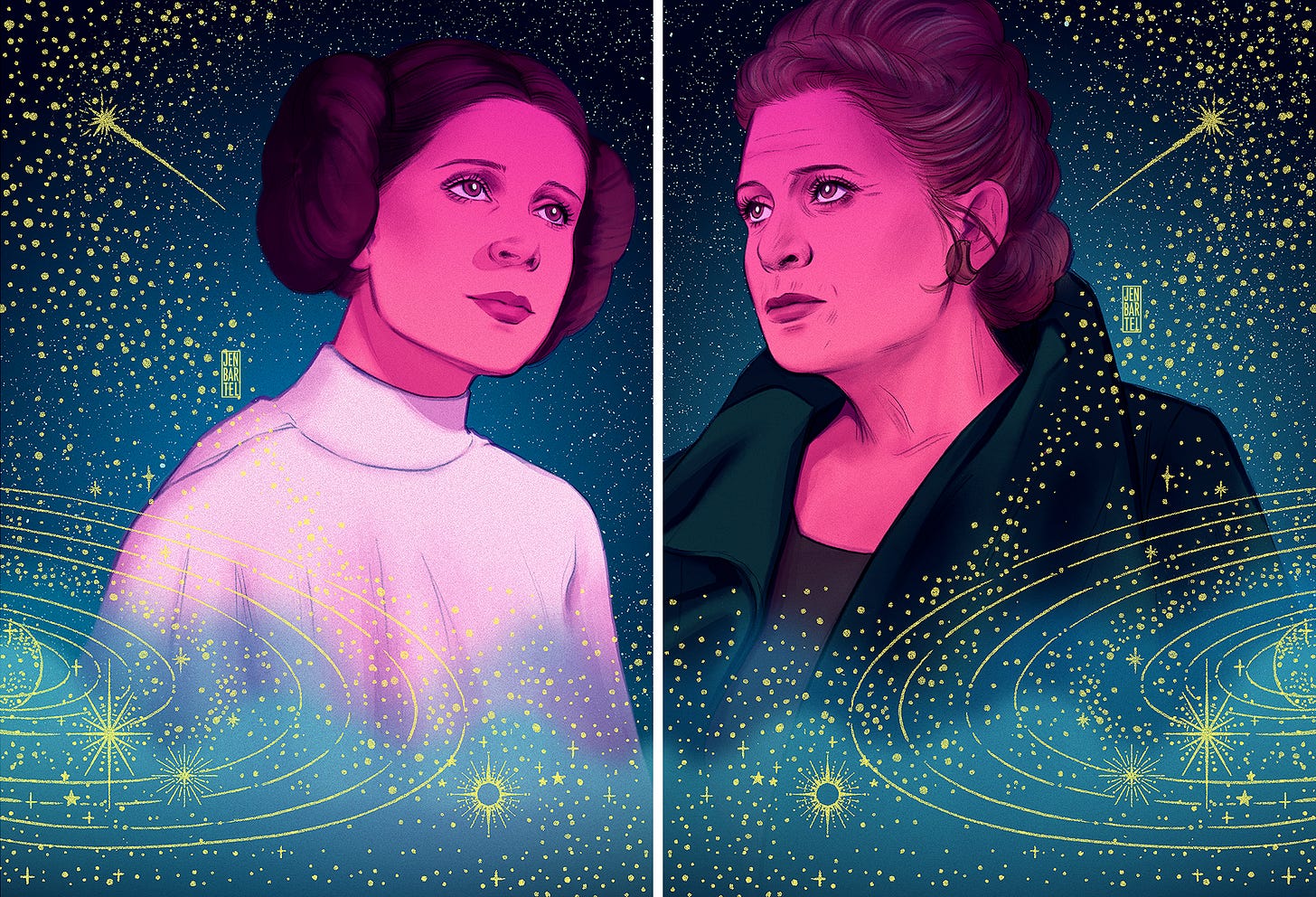
⚠️ Spoilers Ahead, if you’re reading this post and… haven’t watched the latest 3 Star Wars movies, somehow.
When the trailer for Star Wars: The Force Awakens hit the internet, a (very) loud minority was absolutely incensed—not only did this long-awaited Star Wars movie seem to center a female protagonist, it also prominently featured a Black stormtrooper. It had historically always been accepted that the main cast of each Star Wars movie would include a woman, but to have her be the main character? Preposterous. Outcry and conspiracy theories of Woke Disney™ began permeating in conservative circles (laughable, considering The Mouse is notorious for avoiding making any real political statements in their films and shows and has adopted a policy of *~representation~* to avoid having to actually take a meaningful stance on anything that has the potential to be perceived as political).
When the movie finally came out, all signs pointed to the plot moving in an unusual (for Star Wars) direction—that Rey was a nobody, un-special in every way; that Finn was a mere Stormtrooper, a grunt, and yet both characters appeared to be Force-sensitive enough to clearly be setting up the next movie to show at least one of them, if not both, becoming Jedis. Conservative SW fans were not amused by this idea. They wanted to relive their childhoods—to get a new Star Wars film that was exactly like the original trilogy, just with better graphics and production; one which featured a (white) (male) protagonist being a special hero with special powers fighting bad guys on the backdrop of a Western set in space.
In retaliation, they adopted a strategy of full on racist, misogynist online harassment campaigns directed toward the actors themselves. The fervor really didn’t die down for the next 2 years, and by the time The Last Jedi came out, they had perfected the formula. Disney had brought in Rian Johnson to direct, and while I obviously don’t know any details about that movie’s script approval process or how we ended up with the final product, my educated guess is that in an effort to appease angry fans, a directive to gently shift gears a bit from what got the conservative fans all riled up around TFA was implemented.
The usual strategy on major high budget blockbusters like this tends to be Radical Centrism; telling a story that glazes over any inconvenient truths and doesn’t address any issues that can be related back to actual real-world societal problems, and makes people feel just good enough at the end that they don’t question any of it. But somehow, despite the messy storytelling and admittedly high number of cringey scenes (that I’d be willing to bet were caused by too many focus groups designing the movie via committee due to backlash, but I digress), TLJ ultimately managed to embody a message of equality, hope, and living up to our own ideals.
The movie closed on a shot of a little boy, of no apparent privilege or importance, using the Force to pull a broom toward himself. The message of this new trilogy was undeniably: “Anyone can be a Jedi”. That special lineage was not a prerequisite to achieving greatness, that if Equal Opportunity is provided to these “nobodies”, they too, could be protagonists and heroes in the biggest and most widely consumed stories of our time.
So naturally, when the credits rolled, every white, male, conservative, Americana-Cowboy-Myth-believing, TEA-party-aligned franchise fan looked kinda like this:
The backlash was so extreme, in fact, that The Mouse freaked and removed TLJ director Rian Johnson from the next movie and brought back JJ Abrams (a clear sign of Corporate Damage Control Mode). And based on how the final movie in the new trilogy, Star Wars: The Rise of Skywalker turned out, I’m willing to bet the original script was totally and completely scrapped. It was…. the embodiment of Radical Centrism: so much compromise that nobody ended up happy in the end—all because the backlash and harassment from conservative original trilogy fans was so intense that it scared the powers that be into attempting to kowtow to their demands.
Rey of course, ends up finding out she’s a Palpatine. Destined by blood to be a powerful Jedi, blah blah blah, it was a major bummer. It completely undid the work of both TFA and TLJ, and made audiences feel like they had wasted both their time and emotional investment. I actually tweeted about how I would have handled “fixing” TRoS back in 2020, and after digging up what I said, I still stand by it. 😂
Jokes and my Fake Geek Girl spelling aside, the reason so much of the outcry we heard from conservative SW fans ever since 2015 contained sentiments like “Keep politics out of Star Wars!” is that those fans weren’t able to really detect or accurately identify the politics of the original trilogy. George Lucas himself plainly states in the video clip below (a must-watch—it’s only about 3 and a-half minutes long) that the rebels were meant to evoke the Viet-Cong, and that in the larger allegory of Star Wars, the Empire represented us. As in, the USA. If conservative fans saw themselves in characters like Luke, or Han, or any other member of the rebellion, it was only because of their own media illiteracy and utter lack of self-awareness.

And since you made it to the end, here’s a WIP-shot of a drawing I started (literally) 2 years ago—I posted this video of myself working on it and then it promptly fell into a black hole that many of my illustrations fall into when I get overloaded with client work. Some day…. maybe I’ll actually finish it.


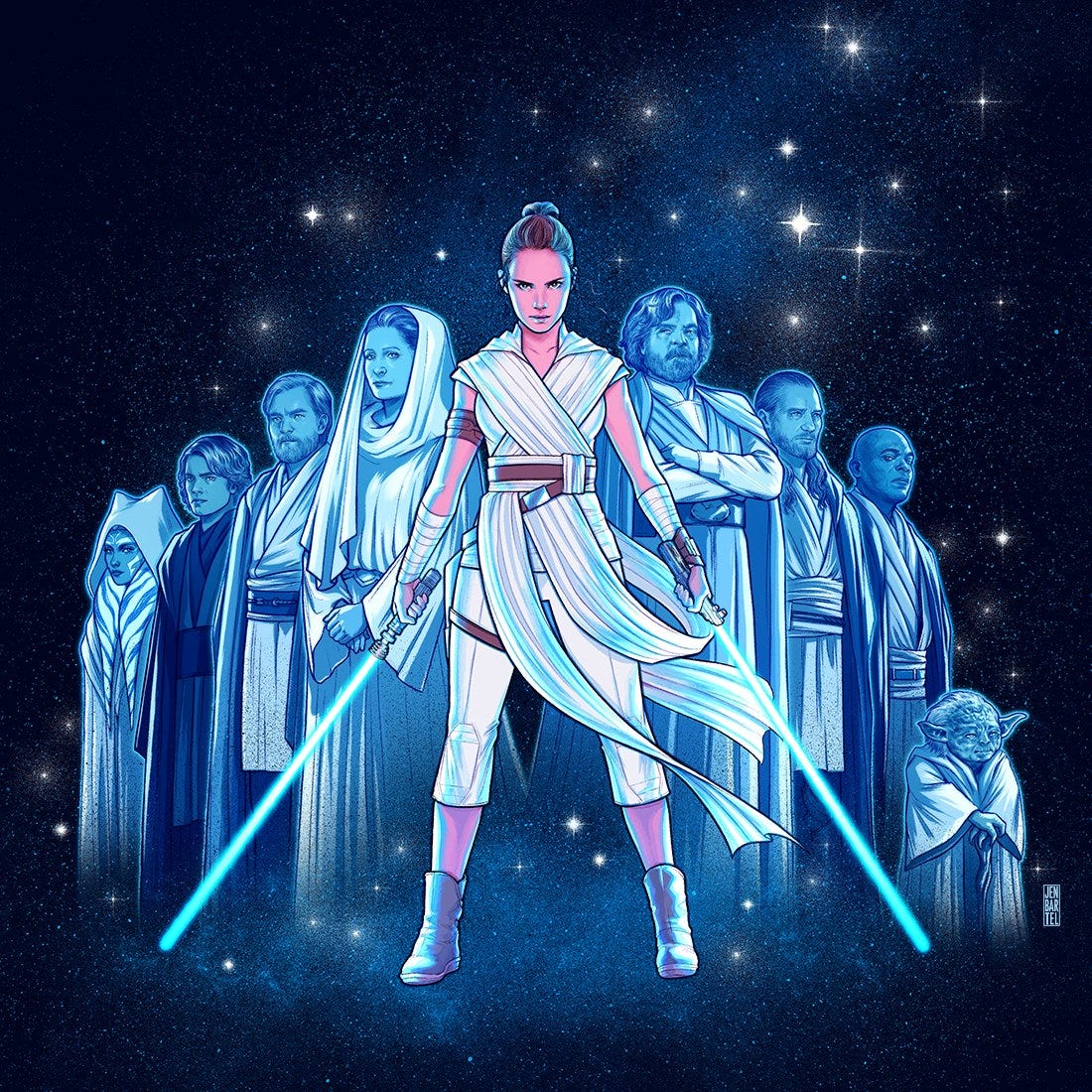


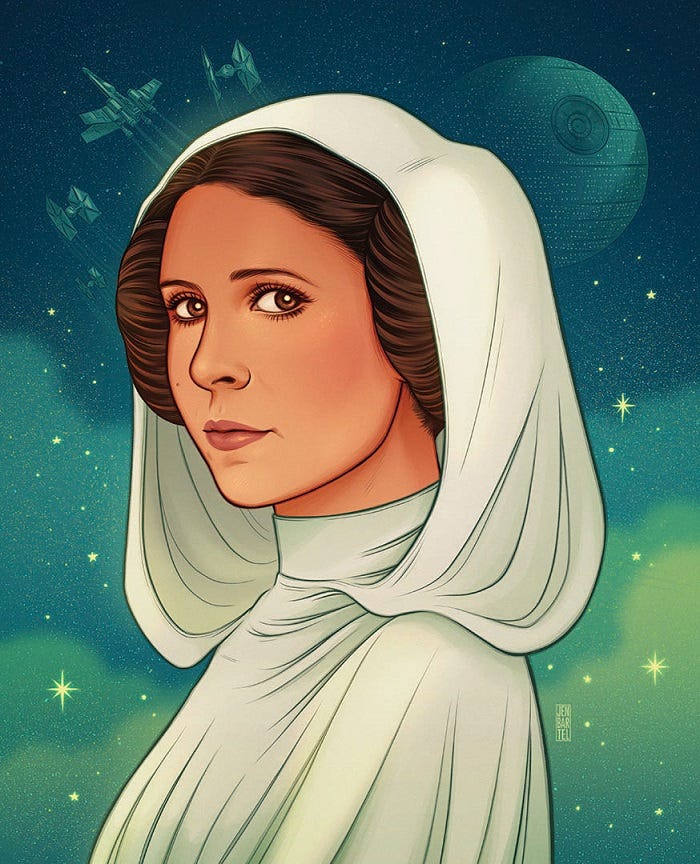


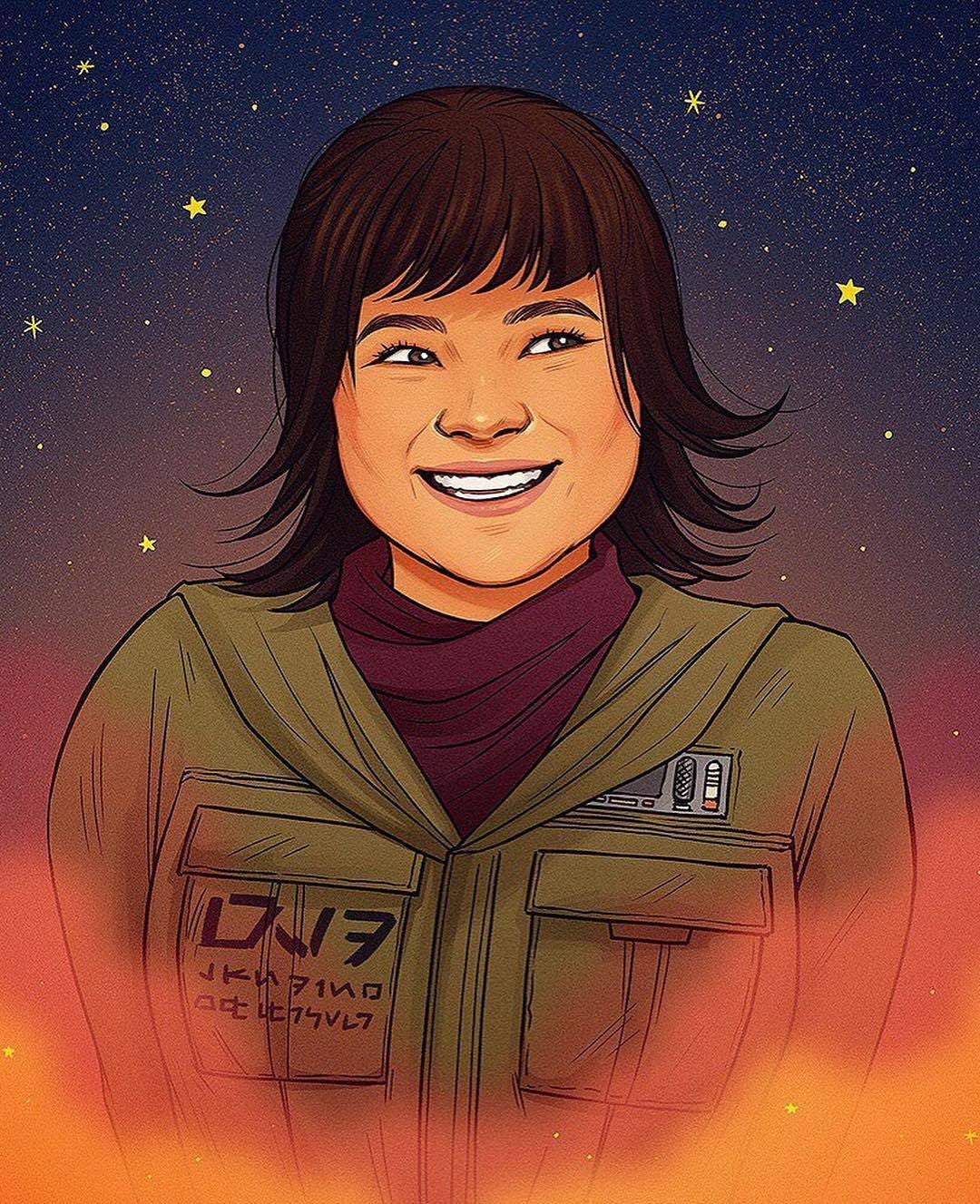
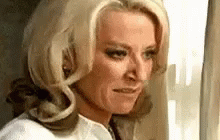

Great post! I'm really enjoying your Thoughts posts. You bring a ton of nuance and insight into these complicated topics. One quibble: Rian Johnson was never directing/writing Episode IX. Instead it was supposed to be Colin Trevorrow (director of Jurassic World), who was no doubt scrapped for the reason you posit in your post. His script leaked online last year and it sounds like it was the complete opposite of Rise of Skywalker, in that it made hard choices and continued the themes of TLJ:
https://www.esquire.com/entertainment/movies/a30882356/full-star-wars-9-original-duel-of-fates-script-colin-trevorrow/
An excellent read! Us Star Wars fans have a ton to live down, and seeing where the particularly toxic and depressingly relentlessly vocal among us came from was worth reading, thanks!
Personally, I disagree about Star Wars being a Western (it has a ton of Western elements of course) as I find it a sci-fi war movie, but a lot of the inherent bootstrapping macho exceptionalism you mentioned is also found in war movies, so I still agree with your overall points in where the Fandom Menace arose. Also really nitpicky, but I don't recall Rian ever being attached to TROS, instead Colin Trevorrow was, but once Duel of the Fates was revealed to be ghastly, they promptly booted him off and had JJ take the skeleton if the script and rework it with Chris Terrio into TROS. I wanted to see Finn lead a Stormtrooper rebellion on the FO Destroyer in the final battle myself, but your idea of the two fighting at the end is simply electrifying, I'd have loved to have seen that.
You ma'am, understand Star Wars very well, and have this diehard Star Wars fan's complete respect!